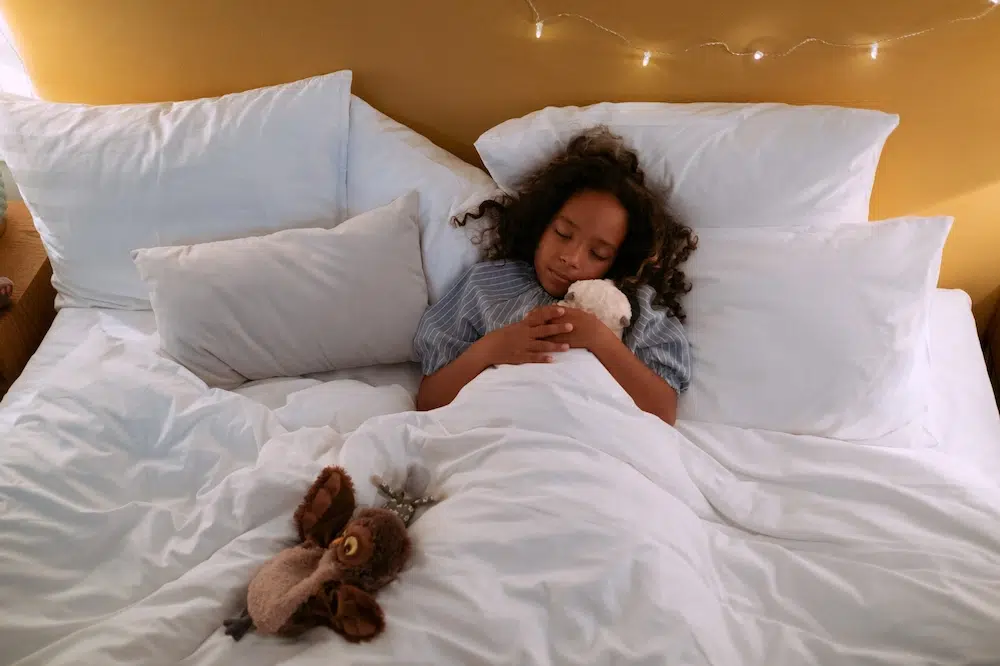
Common Myths About Sleep
Did you know some sleep stories aren’t true? Just like fairy tales or old legends, there are myths about sleep that many believe. From counting sheep to eating cheese before bed, we hear a lot.
This guide will explore these tales and discover their real facts. So, keep reading if you’re curious about the truth about bedtime stories. We’re about to debunk some common myths about sleep and give you the real scoop.
Sweet dreams and happy learning!
Myth 1: You Can Catch Up On Sleep
Explanation Of The Myth
Some people believe that when they miss a few nights, they can sleep more on another night to compensate for it. It’s like thinking eating double the next day will balance things out if you’re hungry one day.
The Reality Of Sleep Debt
However, our bodies don’t work like that with sleep. Missing hours of sleep means losing them for good. We can’t “store” sleep for later.
When we miss out often, we feel tired, and it’s harder to think clearly or be in a good mood.
Tips For Maintaining A Consistent Sleep Schedule
A great tip is to go to bed and wake up simultaneously every day. This helps your body know when it’s time to rest. A quiet, dark room helps, too. It’s like telling your body, “Hey, it’s bedtime now.”
And remember, good sleep makes for happy mornings!
Myth 2: Snoring Is Harmless
Understanding Snoring
Snoring sounds like a funny noise we make when sleeping. It’s the sound of air that can’t move freely through our nose and mouth. Just think of it like a whistle that sounds when it’s a bit blocked.
Health Risks Associated With Snoring
While snoring seems normal, it’s not always safe. Heavy snoring can mean there’s a problem. Sometimes, it’s a sign of sleep apnea. This is when someone stops breathing for a short time while they sleep.
It’s unhealthy and can tire a person during the day.
Ways To Address Snoring Problems
Don’t worry if you or someone you know snores a lot. There are things to help. Talking to a doctor is a good first step. Changing how you sleep, like sleeping on your side, can make a big difference.
There are also special pillows and devices to help keep the air flowing smoothly. It’s like finding the right way to keep that whistle sounding nice and clear.
Myth 3: Drinking Alcohol Helps You Sleep Better
The Link Between Alcohol And Sleep
Some believe having a drink can make bedtime easy. True, alcohol makes eyes feel heavy at first. It’s a bit like a fast-acting lullaby in a glass. But there’s more to this story than just dozing off quickly.
How Alcohol Affects Sleep Quality
The sleep isn’t always deep, even if alcohol sends you to dreamland fast. Instead, it is light and broken, not restful. Imagine it as a nap in a noisy room.
You will sleep but probably wake up feeling like you missed a good rest.
Alternatives For A Better Night’s Sleep
Want great sleep without drinks? Try simple things. Reading a calm story or sipping warm milk can work wonders. Even just making the room dark and cozy helps a lot.
These ways let you dive into deep, dreamy sleep and wake up full of energy and smiles!
Myth 4: You Can Function Well On Just A Few Hours Of Sleep
The Consequences Of Sleep Deprivation
Think of sleep as food for the brain. We feel weak if we eat little. Similarly, with less sleep, our brains aren’t at their best. Tasks become tricky, and staying focused is hard.
Being too tired can even make us feel moody or sick.
Recommended Sleep Duration For Different Age Groups
Each age needs its sleep “food” amount. Kids need the most, about 9-12 hours. Teenagers should aim for 8-10 hours. Adults do best with 7-9 hours. And older folks? 6-8 hours are enough.
It’s like having a special sleep recipe for each age!
Tips For Improving Sleep Quantity And Quality
For better sleep, routine is key. Go to bed and wake up at the same time daily. Make your bedroom quiet and dark. Even try soft music or sounds. These tricks help tell your body, “Time to rest!”
And when you sleep well, your days are just brighter and happier!
Myth 5: Watching Tv Helps You Fall Asleep
The Impact Of Screens On Sleep
TVs and phones seem relaxing, but they’re tricky for sleep. The light from screens can make our brains think it’s daytime. So, instead of getting sleepy, our brain tells us to stay awake. This can lead to staying up way past bedtime.
Blue Light And Sleep Disruption
The main troublemaker is the blue light from screens. This blue light sends strong signals to our brains to stay awake. It’s like a loud alarm telling our body it’s not time to sleep, even when exhausted.
Establishing A Healthy Bedtime Routine
For a sleep-friendly routine, turn off screens early. Choose calm activities like reading a book or chatting with family. Keeping the bedroom dark and quiet also helps.
With these steps, our bodies can get the rest they deserve, making mornings joyful and full of energy.
Myth 6: Napping Is Only For The Lazy
Benefits Of Power Naps
Naps aren’t just for the lazy! A quick nap can boost our energy. Think of it as a short battery recharge. Napping can make our minds clearer, help with memory, and lift our mood.
So, rest can help us do even better during the day.
The Art Of Strategic Napping
Napping is an art. The best naps are short, about 20 to 30 minutes. This length stops us from feeling groggy when we wake up. Finding a quiet spot helps, too. It’s all about resting just enough to feel renewed and ready.
When And How To Incorporate Naps Into Your Routine
Want to add naps to your day? Try napping in the early afternoon. This is when many people feel a little tired. Find a cozy spot, set an alarm, and relax.
With the right napping plan, you can feel like a new person, ready to take on the rest of the day enthusiastically!
Myth 7: Sleeping Pills Are A Safe And Effective Solution
The Role Of Sleeping Pills
Sleeping pills can help people fall asleep. Some doctors give them to patients who have real trouble sleeping. These pills are helpful but not always the best solution for everyone or long-term use.
Potential Side Effects And Risks
Like all medicines, sleeping pills have side effects. Some people feel dizzy or have headaches. Others still feel sleepy the next day. Plus, when taken for many days, a person can become dependent on them, which is not good.
Alternative Approaches To Improve Sleep
Instead of pills, there are natural ways to sleep better. Keeping a regular bedtime, relaxing before sleep, and making the bedroom quiet and dark can help.
Other methods, like meditation or gentle exercises, can also guide the body to a peaceful night’s rest without needing medicine.
Myth 8: Sleep Disorders Are Rare
Prevalence Of Sleep Disorders
Some think sleep disorders are rare, but many people face them. Many folks have a sleep disorder and do not even know it. These issues are more common than most believe and affect many lives daily.
Common Types Of Sleep Disorders
There are different sleep disorders. Some can’t fall asleep. Others wake up a lot at night. Conditions like sleep apnea, where breathing stops briefly, or insomnia, where sleep is hard to find, are just a few examples from a long list.
Seeking Professional Help For Sleep Issues
It’s good to see a doctor if sleep problems persist. They can provide guidance, offer tests, and suggest solutions. Everyone deserves good sleep. And with the right help, many can find the restful nights they’ve been missing.
It’s never too early or too late to seek expert advice.
Myth 9: Everyone Needs The Same Amount Of Sleep
Variability In Sleep Needs
The truth is, we’re all different. Like we all like different foods or movies, our sleep needs vary, too.
While most adults aim for 7-9 hours, some feel great with more or less sleep. It’s all about what feels right for each person.
Factors Influencing Individual Sleep Requirements
Several things decide how much sleep we need. Age is a big one. Babies sleep a lot, but seniors need less. Daily activities, health, and even stress can change our sleep needs.
It’s a mix of many things that shape our ideal sleep amount.
Personalizing Your Sleep Schedule
Listen to your body. You need more sleep if you’re tired. That’s okay, too, if you wake up early and feel good. Set a routine that suits your needs.
By understanding our bodies and adjusting our schedules, we can find the perfect balance for restful nights.
FAQs
1. Is Catching Up On Sleep Possible?
You can recover from short-term sleep loss, but always “catching up” isn’t ideal. Regular, good sleep is the best approach. Try to sleep more on the weekends and adjust your routine if you miss hours.
2. Does Snoring Harm Your Health?
Snoring is harmless, but loud, frequent snoring indicates sleep apnea, requiring attention. Sleep apnea can impact overall health. Seeking a doctor’s advice is wise if you are concerned.
3. Does Alcohol Aid Sleep Quality?
While alcohol initially makes you sleepy, it can disrupt deep sleep cycles. This means the sleep quality is poorer. It’s best to consume alcohol in moderation and not rely on it for sleep.
Conclusion
Sleep is a journey we all take every night, but sometimes myths confuse our path. From believing everyone needs the same sleep time to think snoring is always harmless, these common myths about sleep can lead us astray.
It’s essential to understand the truth about these myths so we can achieve the best rest. Sleep is vital for our well-being and health. We can all look forward to better nights and brighter days by breaking these myths and getting facts.
Remember, the key is to listen to our bodies and seek the right advice when in doubt. Sleep tight!



